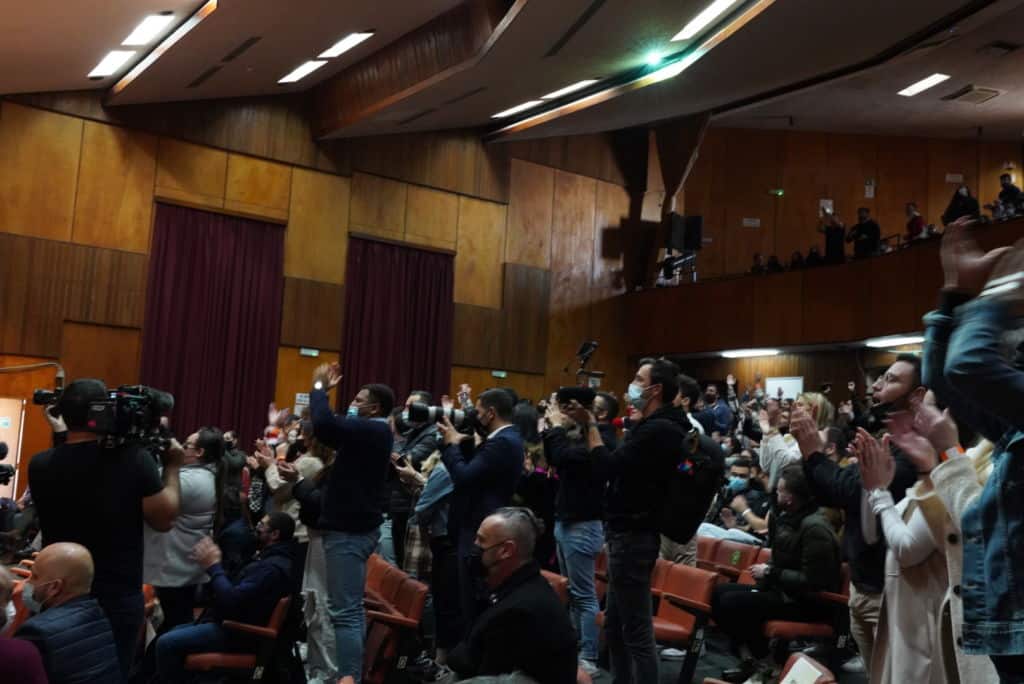
Photo: Lovin Malta
There were various opinions about who might have done better in yesterday’s leaders’ debate at university. But there’s no controversy over who did worst. Most of the audience was often on its feet, arms raised, shouting Viva l-Lejber like the audience of the daily newsreels in 1984.
At the sight of enemies they have been programmed to hate, they shouted in anger or mocked in derision. At the sight of Big Brother, the idol they have been programmed to worship, they screamed in delight and applauded in collective orgasm.
I used to wonder at civil society marches and vigils were all the young people were and what they were doing. I could tell myself yesterday they were all taking lessons in civic responsibility from Karl Stagno Navarra.
And yet, to equate the behaviour of this bunch of idol worshippers with “university students” or “the leaders of tomorrow” or “this generation” is reductive and erroneous. They amount to about 800 people, a small fraction of “university students”, “the leaders of tomorrow” and “this generation”. Most of the students at the university who behave like fanatics of a cult booked a seat in the hall yesterday. Most of the rest of the students didn’t.
This is not some hollow optimism like that time when George Vella said that the gang of crooks who shamed our country in the eyes of the world were not truly representative of the Maltese people. Quite apart from any redeeming factors we look for to prevent ourselves from despairing for our country’s future, here are some observations that we can’t escape.
As anywhere else, even at university the exchange of views in a political debate is not intended to persuade, and does not have the effect of persuading, anyone of anything. Politicians use words to spar, but ‘sparring’ is not just a figure of speech. They might as well box, wrestle, strip down to their speedos and oil themselves up, or play one of those silly games on desert island reality competitions.
In any political debate you’d expect some cheap blows below the belt. In a debate in Malta, in university and out of it, speakers barely ever rise above the belt. It’s mostly a series of cheap shots aimed to justify the applause of the mobilised supporters.
Consider the moment when Bernard Grech suggested a one-day suspension of hostilities for a united march in solidarity with the people of Ukraine. The point was pointedly ignored, by audience and interlocutors alike. Even on what we profess to agree, politicians can’t seem to afford to be seen to do so.
The chanting of Viva l-Lejber, the hero worship of Robert Abela at the mere sight of him, is embarrassing because students who supported him were not able to contain their enthusiasm until he said something worth applauding to. As Ariadne Massa observes in today’s Times of Malta, Robert Abela sprayed his shorts with delight at the adulation from the stalls.
Robert Abela is a Laburist from my generation of university students. At the time, you didn’t shout about being a Laburist. You needed to explain how you supported Alfred Sant and objected to EU membership and there wasn’t much you could say in your defence. Being Laburist was not something to be proud of. Which is perhaps why Robert Abela had no university life to speak of and focused instead on the muscles around his belly button.
Like Joseph Muscat’s fabled trips to St Aloysius’, Robert Abela yesterday looked like a bullied child, all growed up, returning to his old schoolyard unable to restrain his pride at having outlived all those who had underestimated him, the ones that according to Mark Camilleri used to call Robert Abela “tuba” as a term of endearment.
There was a lot of bullying in yesterday’s screaming and shouting. Those 800 or so Laburisti behaved like Chinese students of the Cultural Revolution. They shouted down dissent, bullied everyone into embarrassed silence, not just the minority inside the theatre that squirmed quietly in their seats or retorted timidly with unfashionable support for Bernard Grech. The behaviour of the bullies is just what kept all those other thousands of students and academics who still consider a political debate as an opportunity to understand who is asking them for their vote and why.
I do not object to the rowdiness of student events. I do not object to explicit expressions of dissent with boos and jeers on disagreement. I do not object to the heckles from the floor. A political debate in university should be a difficult experience for politicians and they must prove able to persuade over the scepticism of their audience or pack up and choose another job.
I object to senseless hero worship, to the bleating of sheep ‘four legs good, too legs bad’. I object to brown shirts in plain clothes. I object to the shouting down of discourse, and political opinions, with hollow tautological slogans that represent nothing but assertions of power. ‘Viva l-Lejber’ is not a political slogan. It does not propose anything or express a wish for anything except power, for ever.
I do expect better than that from university students. I do expect them to be concerned with the fundamentals: ethics in public life, solidarity with the downtrodden, peace in our time, the rights of minorities, the protection of basic liberties. ‘Viva l-Lejber’ touches none of that. It is, in some respects, an assault on these basic concerns.
Obviously organised and mobilised by their party and perhaps its youth and student wings, those bullies made it clear they would shout down any dissent not just at that debate but anywhere.
In a university that applauds him merely for showing up, it is no wonder Robert Abela cannot help grinning.